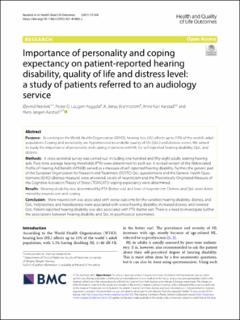| dc.contributor.author | Nordvik, Øyvind | |
| dc.contributor.author | Heggdal, Peder O Laugen | |
| dc.contributor.author | Brännström, K. Jonas | |
| dc.contributor.author | Aarstad, Anne Kari | |
| dc.contributor.author | Aarstad, Hans Jørgen | |
| dc.date.accessioned | 2021-10-20T13:11:23Z | |
| dc.date.available | 2021-10-20T13:11:23Z | |
| dc.date.created | 2021-07-27T13:18:42Z | |
| dc.date.issued | 2021 | |
| dc.identifier.citation | Nordvik, Ø., Heggdal, P. O. L., Brännström, K. J., Aarstad, A. K., & Aarstad, H. J. (2021). Importance of personality and coping expectancy on patient-reported hearing disability, quality of life and distress level: a study of patients referred to an audiology service. Health and Quality of Life Outcomes, 19(1), 168. | en_US |
| dc.identifier.issn | 1477-7525 | |
| dc.identifier.uri | https://hdl.handle.net/11250/2824188 | |
| dc.description.abstract | Purpose
According to the World Health Organization (WHO), hearing loss (HL) affects up to 15% of the world’s adult population. Coping and personality are hypothesized to underlie quality of life (QoL) and distress scores. We aimed to study the importance of personality and coping in persons with HL for self-reported hearing disability, QoL, and distress.
Methods
A cross-sectional survey was carried out, including one hundred and fifty-eight adults seeking hearing aids. Pure-tone average hearing thresholds (PTA) were determined for each ear. A revised version of the Abbreviated Profile of Hearing Aid Benefit (APHAB) served as a measure of self-reported hearing disability. Further, the generic part of the European Organization for Research and Treatment (EORTC) QoL questionnaire and the General Health Questionnaire (GHQ) (distress measure) were answered. Levels of neuroticism and the Theoretically Originated Measure of the Cognitive Activation Theory of Stress (TOMCATS) coping expectancy were determined.
Results
Hearing disability was determined by PTA (better ear) and level of neuroticism. Distress and QoL were determined by neuroticism and coping.
Conclusion
More neuroticism was associated with worse outcome for the variables hearing disability, distress, and QoL. Helplessness and hopelessness were associated with worse hearing disability, increased distress, and lowered QoL. Patient reported hearing disability was also associated with PTA (better ear). There is a need to investigate further the associations between hearing disability and QoL to psychosocial parameters. | en_US |
| dc.language.iso | eng | en_US |
| dc.publisher | BMC | en_US |
| dc.rights | Navngivelse 4.0 Internasjonal | * |
| dc.rights.uri | http://creativecommons.org/licenses/by/4.0/deed.no | * |
| dc.title | Importance of personality and coping expectancy on patient-reported hearing disability, quality of life and distress level: a study of patients referred to an audiology service | en_US |
| dc.type | Peer reviewed | en_US |
| dc.type | Journal article | en_US |
| dc.description.version | publishedVersion | en_US |
| dc.rights.holder | © The Author(s) 2021 | en_US |
| dc.subject.nsi | VDP::Medisinske Fag: 700::Helsefag: 800 | en_US |
| dc.source.volume | 19 | en_US |
| dc.source.journal | Health and Quality of Life Outcomes | en_US |
| dc.source.issue | 1 | en_US |
| dc.identifier.doi | 10.1186/s12955-021-01802-z | |
| dc.identifier.cristin | 1922778 | |
| dc.relation.project | Norges forskningsråd: 188928 | en_US |
| dc.source.articlenumber | 168 | en_US |
| cristin.ispublished | true | |
| cristin.fulltext | original | |
| cristin.qualitycode | 1 | |

